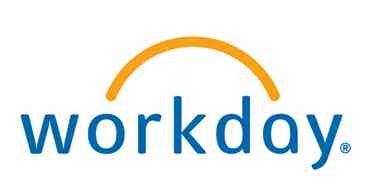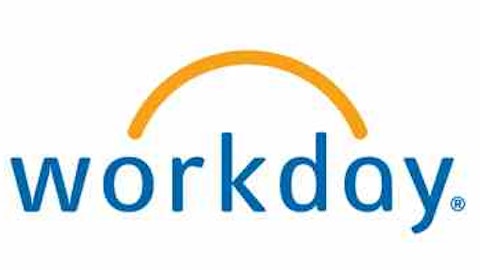One of the more interesting data points to emerge from 2012 is that “the cloud” dominated merger activity during the year.
Some of the biggest deals involved cloud applications that could be sold to enterprises, specifically Oracle Corporation (NASDAQ:ORCL)‘s purchase of Taleo and International Business Machines Corp. (NYSE:IBM)‘s purchase of Kenexa.
Obviously there remains a big appetite for cloud applications. So who might be the next to go?

Workday only went public a few months ago, and has gained just 7% from its first trade, and is presently trading at near $51/share, a market cap of $8.5 billion.
Workday produces what it calls “human capital management” software, so it’s competitive with both Taleo and Kenexa. Institutions own just 13% so it is highly vulnerable to an unfriendly bid. It has reported sales going back a year, demonstrating impressive quarter-to-quarter growth, but the current stock price is still 50 times those revenues. (As to profits, you really don’t want to see them in such a fast-growing company, but margins are approaching break-even.)
Workday’s architecture stack is based on transaction processing, not data analysis, so it’s very fast. The key value store is kept in mySQL, an open source database now owned by Oracle, and Inno/DB – both are under the General Public License. The company’s technology goal is to speed up handling even further by putting all client data on chips, rather than on disk.
Who might be a buyer? SAP AG (ADR) (NYSE:SAP) might be a buyer. The Workday architecture uses approaches SAP itself was considering just a few years ago.
Tibco Software Inc. (NASDAQ:TIBX)
Tibco predates cloud in the industry, so its latest software is an evolution from older, enterprise approaches. That’s actually a good thing, because it makes the company a better fit with existing enterprise players that want to give their customers a glide path into cloud.
The company’s market cap is $3.67 billion, and it actually has earnings. Holders of the stock are paying less than four times the annual revenues for the company, based on last year’s number of $1.02 billion in sales. Since 2009, those sales have doubled, while profit margins have been on a steady uptick.
Tibco is in the data analysis space, middleware that enables the creation of applications in a variety of areas. Its most recent acquisition, in 2010, was LoyaltyLabs, which works in the marketing space. But since it’s a platform, it’s applicable across industry groups.
Who might be a buyer? Dell Inc. (NASDAQ:DELL) might be the best fit here, but that’s not going to happen given that all the company’s efforts are currently focused on going private. I’d look more toward SAP again, or perhaps Oracle.
EBIX Inc (NASDAQ:EBIX)
Ebix is a company I’ve owned a piece of for some months, and its performance as an investment has not mirrored its success as a company, especially since a Nov. 5 Bloomberg article that said the SEC is investigating its accounting practices.
Ebix provides provides software for insurers, allowing them to create online marketplaces for their products. It has been pushing heavily into health insurance, making a number of acquisitions in that space during 2012.
Copperfield Research has been on the warpath against Ebix, claiming its accounting controls are inadequate and questioning the company’s denial of any SEC action against them.
If the financial statements are to be believed, however, you have a company that has more than doubled revenues in just three years, maintaining margins over 40%, that currently sells at a multiple to earnings of just 10.3. Should the company be cleared of the charges against it, it would run up quickly, meaning now may be a good time for someone to strike.
That someone, I suspect, may well be salesforce.com, inc. (NYSE:CRM), which could use Ebix’s software to create self-service marketplaces in a number of other areas beyond insurance and, perhaps, spin-off the health assets and make most of its investment back.
athenahealth, Inc (NASDAQ:ATHN)
Of all the companies I looked at for this piece, athenahealth, Inc is by far the hottest and, ironically, the one least subject to takeover. Shares are up 51% in just the last three months.
Athena was originally built to do billing for doctors and clinics, but it switched gears a few years ago to deliver complete Electronic Health Records, or EHRs. This put it in direct competition for stimulus cash with companies like Cerner Corporation (NASDAQ:CERN) and Allscripts Healthcare Solutions Inc (NASDAQ:MDRX), and it’s partly the problems at the latter company that may be behind its current rise.
A lot of early interest in the company comes from its supposed political connections. Co-founder Jonathan Bush is a distant relative of the Presidents Bush, while the other co-founder, Todd Park, left the company in 2009 to join the Obama Administration, where he is now the Chief Technology Officer.
Athena has always been a Software as a Service company, the final step in an evolution to cloud, but the health business has stagnated unexpectedly. The administration offered billions in stimulus cash to hospitals and clinics a few years ago, but many have yet to take on the challenge, even though they face harsh penalties if they don’t move by fiscal 2015, which is now just 18 months away.
Still, Athena’s concentration on getting people paid has helped it deliver solid sales growth, and brought an average 10% of sales to the bottom line. It’s now debt-free, it seems to have great growth prospects, and it might find a really good home at an existing SaaS firm, like Salesforce or, perhaps, at IBM, especially if the stock is hit by a bad quarter.
My Foolish Take
Of all these companies, WDAY seems the most obvious choice as a take-out target. Other companies in the space have gone to the altar, it could be gotten by either friendly or unfriendly means. But if I had to put some money to put to work today, I might prefer EBIX, which could be highly vulnerable if the SEC does take action, and would thus deliver a solid bargain to a buyer.
The article Which Cloud Companies Might Be Bought Next? originally appeared on Fool.com and is written by Dana Blankenhorn.
Copyright © 1995 – 2013 The Motley Fool, LLC. All rights reserved. The Motley Fool has a disclosure policy.





